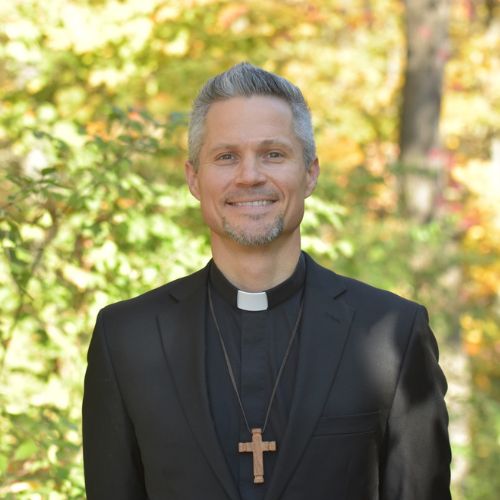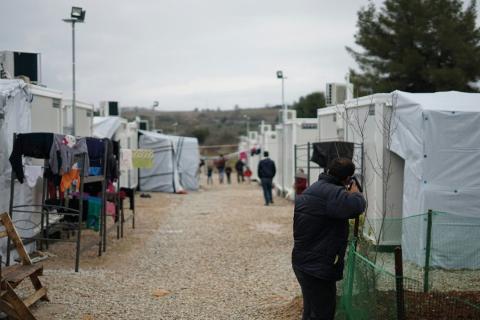An interview with Rev. Aaron Wessman, author of “The Church’s Mission in a Polarized World,” about overcoming division in society —and in the Church itself

Adobe Stock
Interview by Susanne Janssen
What motivated you to write a book on polarization?
In 2017, after spending nearly four years in Belgium and being somewhat sheltered from the cultural situation back home, I returned to the United States.
Within weeks of being back, I realized—intuited—that something had changed. The tension, divisiveness and negativity were tangible. I saw this in churches, with friends, in loved ones, and in my own ministry.
I naively thought I could stay above the fray—you know, I was above what was happening, because I had spent time abroad. However, within weeks I was pulled in. I began to see how the polarized culture of the U.S. affected me.
I was not proud of what I saw. Somewhat in desperation, I began to research the topic of polarization and was later asked to do a few presentations on the subject.
Many people were moved. They had seen polarization affecting those they love, and themselves, and wanted answers—they were looking for reasons to hope.
After one presentation a person suggested I write a book on the topic. It did not register in me at the time. But it was a seed. After a while, I thought that perhaps I needed to do this. The book emerged out of this situation.
The Church has the answer to respond to a polarized world, and it’s in our own tradition. In Jesus Christ there is no “us vs. them.”
What we can do to overcome this mentality is really start to cross over to those who are different than us, learn about them, be around them, recognize that in many ways we share common humanity and common ground together.
Thinking of American society—people not talking to those from “the other party,” not socializing with those who think differently—what can be done to change the status quo? Sometimes it seems as if we live in two different worlds.
We do live in two different worlds—quite literally. The fact that we have sorted the United States into two groups that are radically different in so many ways, and that are separated somewhat geographically, makes the challenge more profound.
However, there are some real practical steps to move forward.
First, from a political perspective, I suggest people stop watching so much network news, and limit their time on social media. Research suggests that both these tend to deepen polarization and negativity.
If one wants to stay on top of the news and be informed, there are outlets that specifically try to bring together different voices, such as Divided We Fall, and other bridge building outlets. If a program does not bring together genuine dialogue partners representing different perspectives, it is not likely to help our polarized situation. It will probably not help us be too informed either.
Second, we need to understand what we mean by polarization. Understanding a thing can help us gain some control of the situation.
Clearly, polarization is a complex topic. There are certain dynamics in polarized culture that can affect us indirectly, and even unconsciously. We need to know how this can be the case.
I try to present the topic in an accessible way in my book, but other resources are helpful as well. Ezra Klein’s Why We’re Polarized is insightful.
I also provide some very practical steps for engaging people who are different, such as at a holiday gathering or in a church.
The three tools I present are flexibility, curiosity and prudence. I have found these tools to be very helpful in my own ministry and life. I think they can help us in the political realm, and in the Church, as well.
As you explain in your book, the Catholic Church is deeply affected by polarization. In your opinion, what are the main reasons?
The Church doesn’t exist in a vacuum. She is in the world, trying to figure out how not always to be “of the world.” So, if the culture is polarized, the Church is likely to be polarized, too.
Of course, one issue is that politics in the United States has become super influential in people’s lives. Politics is everywhere. And by politics, here, I also mean our political parties.
Members of the Catholic Church, for instance, vote far more in line with the values of their political party, whether Democrat or Republican, and less in line with the values of Christianity. This is a challenge if we want to witness to the world what it means to follow Jesus.
But Christians are also guilty of intensifying polarization. In my book, I show how, over three to four decades, members of the Church have increasingly adopted the “culture war” metaphor, not only to promote political activity, but to promote discipleship and mission!
In my book, I show how powerful, and problematic, the metaphor of war can be. When Christians utilize war as a metaphor to guide mission and evangelization, we begin to see the other as an enemy who needs to be destroyed at all costs.
Sadly, sometimes, that “other” is even a fellow member of the body of Christ.
Unfortunately, especially since Vatican II, there has been the emergence of so-called progressive and conservative groups in the Church, and it seems that these groups somewhat align politically.
When this happens, I think Christians put aside the overwhelming plea of our tradition to remain united, and give into, and promote the divisions that exist today in our American context.
The effects of crossing over can truly change the polarized climate.
Both sides—“progressives” and “traditionalists”—act in good faith. However, often it comes down to a culture war that doesn’t bear witness to Church unity. How can we avoid falling into an “us vs. them” mentality?
I think we need to begin to cross over. For example, if I feel more comfortable in a “progressive” ecclesial environment, I should consider attending the “traditional” parish in my city or town at least once in a while.
If I am more comfortable reading right-of-center Christian commentary or news, I should read perspectives from the left-of-center. Or, better yet, I should find podcasts and articles that attempt to bring together different voices, and do so in a way that is charitable, seeking out the truth in each opinion.
Ultimately, for Christians, I think we should return to the saintly figures of our own tradition. In my book, I reflect on the lives of people like Thomas Aquinas, Dorothy Day and Damien of Molokai, to show how they can guide us today.
Finally, I think we need to approach the world, and the “other,” in a truly catholic way: cross over to them, engage them through curiosity, ask a lot of questions, listen and be open to learn. The Spirit can slowly work with each of us, deepening the unity that Jesus has already placed in his Church.
One of the important things for us to do is to recognize that we’re not going to be able to cross over and enter into a healthy dialogue with every single person. Because of that, find groups and find organizations whose sole purpose is to bring about these kinds of encounters.
The title of your book is The Church’s Mission in a Polarized World. In a nutshell, what are the most important steps that we need to take?
The first thing the church needs to do, in my humble opinion, is recognize that there is a problem, and that there is a way out.
For journalists, theologians and pundits, limiting our use of the culture war metaphor in our writing and in our conversations will significantly help alleviate some of the challenges of polarization.
We are not enemies. We are not at war with each other. We are fellow members of the body of Christ. The war metaphor has an intoxicating, misleading, effect on us, and we need to cease using it.
Then, I think, especially the Church needs to begin to dig deep into her tradition, especially that given to us in Jesus, to renew our commitment to what I call Jesus’ “incarnational movement.”
In a practical way, this means identifying those groups or people for whom we know we have negative feelings and thoughts, and choosing to be around them. The effects of crossing over can truly change the polarized climate.
Still more, I think the Church can model what it means for people to find ways to have deep, constructive conversations about what is meaningful and valuable in our lives. If we have liturgical differences, theological differences or different opinions regarding pastoral practice, we can have conversations about these. These conversations matter!
There’s just something about being in front of another person to see the sacredness of the other. So, create venues where you can say, “We’re going to just talk about our stories here.”
Why do I have the political positions that I have? How did my upbringing affect that? When we listen to one’s story, we begin to see the person, not just the issue.
If you enjoyed this article, you might like...
Have you found successful models for overcoming the inability to dialogue among the different currents and for building bridges? What gives you hope for the future of the Church?
There is a great contradiction. Christians are struggling to resist polarized culture, and we are even contributing to it.
Yet, the message of the Gospel, and the example of Jesus, give us a way out of this storm. Jesus’ incarnational movement provides us with a way to undo polarizing tendencies.
I am hopeful, because so many people are responding in ways that are alleviating many of the negative effects of polarization. From organizations like Braver Angels, to Focolare, to figures like Br. Craig Digmann or Daryl Davis, there are examples all around us that provide hope.
Daryl Davis is an African American musician and activist who suffered from racism as he was growing up. Daryl made it his whole life’s journey to go to Klan rallies all over the place, and just be present. And over 200 people have left the Klan because of him.
I am somewhat of a novice in the Focolare community. But I’ve been so moved by the example that I have seen in the members’ ability to cross over into situations of division, suffering, difficulty, and not shy away from it, but actually move towards it, not knowing what the outcome might be.
I have personally grown from writing this book. It is rare for an academic to write a book that also helps one deepen one’s own discipleship. This book has changed me, and I hope it changes others as well.














